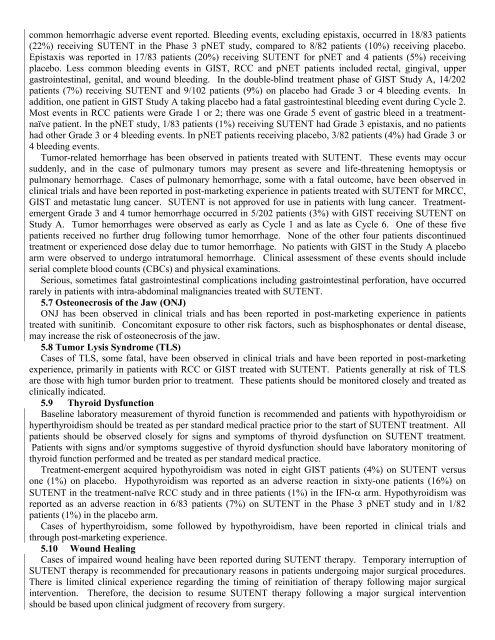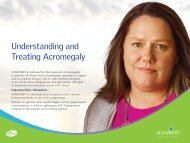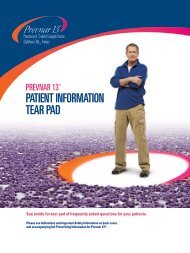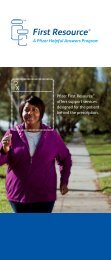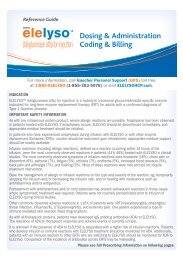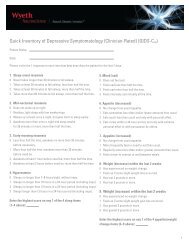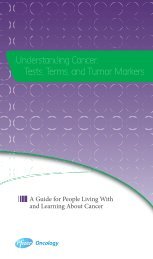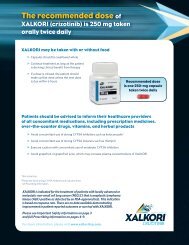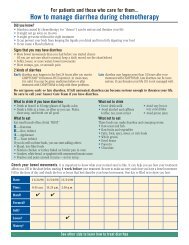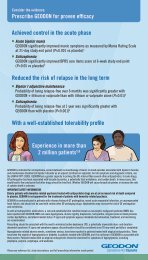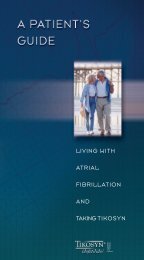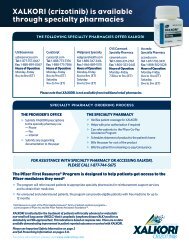You also want an ePaper? Increase the reach of your titles
YUMPU automatically turns print PDFs into web optimized ePapers that Google loves.
common hemorrhagic adverse event reported. Bleeding events, excluding epistaxis, occurred in 18/83 patients<br />
(22%) receiving SUTENT in the Phase 3 pNET study, compared to 8/82 patients (10%) receiving placebo.<br />
Epistaxis was reported in 17/83 patients (20%) receiving SUTENT for pNET and 4 patients (5%) receiving<br />
placebo. Less common bleeding events in GIST, RCC and pNET patients included rectal, gingival, upper<br />
gastrointestinal, genital, and wound bleeding. In the double-blind treatment phase of GIST Study A, 14/202<br />
patients (7%) receiving SUTENT and 9/102 patients (9%) on placebo had Grade 3 or 4 bleeding events. In<br />
addition, one patient in GIST Study A taking placebo had a fatal gastrointestinal bleeding event during Cycle 2.<br />
Most events in RCC patients were Grade 1 or 2; there was one Grade 5 event of gastric bleed in a treatmentnaïve<br />
patient. In the pNET study, 1/83 patients (1%) receiving SUTENT had Grade 3 epistaxis, and no patients<br />
had other Grade 3 or 4 bleeding events. In pNET patients receiving placebo, 3/82 patients (4%) had Grade 3 or<br />
4 bleeding events.<br />
Tumor-related hemorrhage has been observed in patients treated with SUTENT. These events may occur<br />
suddenly, and in the case of pulmonary tumors may present as severe and life-threatening hemoptysis or<br />
pulmonary hemorrhage. Cases of pulmonary hemorrhage, some with a fatal outcome, have been observed in<br />
clinical trials and have been reported in post-marketing experience in patients treated with SUTENT for MRCC,<br />
GIST and metastatic lung cancer. SUTENT is not approved for use in patients with lung cancer. Treatmentemergent<br />
Grade 3 and 4 tumor hemorrhage occurred in 5/202 patients (3%) with GIST receiving SUTENT on<br />
Study A. Tumor hemorrhages were observed as early as Cycle 1 and as late as Cycle 6. One of these five<br />
patients received no further drug following tumor hemorrhage. None of the other four patients discontinued<br />
treatment or experienced dose delay due to tumor hemorrhage. No patients with GIST in the Study A placebo<br />
arm were observed to undergo intratumoral hemorrhage. Clinical assessment of these events should include<br />
serial complete blood counts (CBCs) and physical examinations.<br />
Serious, sometimes fatal gastrointestinal complications including gastrointestinal perforation, have occurred<br />
rarely in patients with intra-abdominal malignancies treated with SUTENT.<br />
5.7 Osteonecrosis of the Jaw (ONJ)<br />
ONJ has been observed in clinical trials and has been reported in post-marketing experience in patients<br />
treated with sunitinib. Concomitant exposure to other risk factors, such as bisphosphonates or dental disease,<br />
may increase the risk of osteonecrosis of the jaw.<br />
5.8 Tumor Lysis Syndrome (TLS)<br />
Cases of TLS, some fatal, have been observed in clinical trials and have been reported in post-marketing<br />
experience, primarily in patients with RCC or GIST treated with SUTENT. Patients generally at risk of TLS<br />
are those with high tumor burden prior to treatment. These patients should be monitored closely and treated as<br />
clinically indicated.<br />
5.9 Thyroid Dysfunction<br />
Baseline laboratory measurement of thyroid function is recommended and patients with hypothyroidism or<br />
hyperthyroidism should be treated as per standard medical practice prior to the start of SUTENT treatment. All<br />
patients should be observed closely for signs and symptoms of thyroid dysfunction on SUTENT treatment.<br />
Patients with signs and/or symptoms suggestive of thyroid dysfunction should have laboratory monitoring of<br />
thyroid function performed and be treated as per standard medical practice.<br />
Treatment-emergent acquired hypothyroidism was noted in eight GIST patients (4%) on SUTENT versus<br />
one (1%) on placebo. Hypothyroidism was reported as an adverse reaction in sixty-one patients (16%) on<br />
SUTENT in the treatment-naïve RCC study and in three patients (1%) in the IFN- arm. Hypothyroidism was<br />
reported as an adverse reaction in 6/83 patients (7%) on SUTENT in the Phase 3 pNET study and in 1/82<br />
patients (1%) in the placebo arm.<br />
Cases of hyperthyroidism, some followed by hypothyroidism, have been reported in clinical trials and<br />
through post-marketing experience.<br />
5.10 Wound Healing<br />
Cases of impaired wound healing have been reported during SUTENT therapy. Temporary interruption of<br />
SUTENT therapy is recommended for precautionary reasons in patients undergoing major surgical procedures.<br />
There is limited clinical experience regarding the timing of reinitiation of therapy following major surgical<br />
intervention. Therefore, the decision to resume SUTENT therapy following a major surgical intervention<br />
should be based upon clinical judgment of recovery from surgery.


